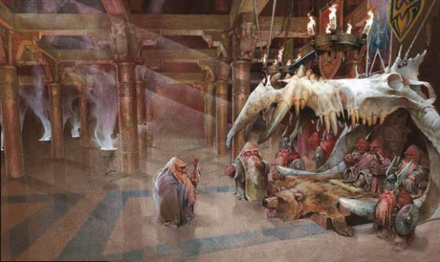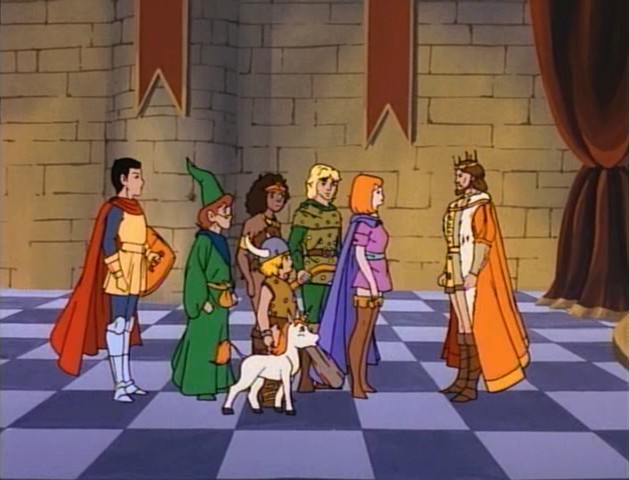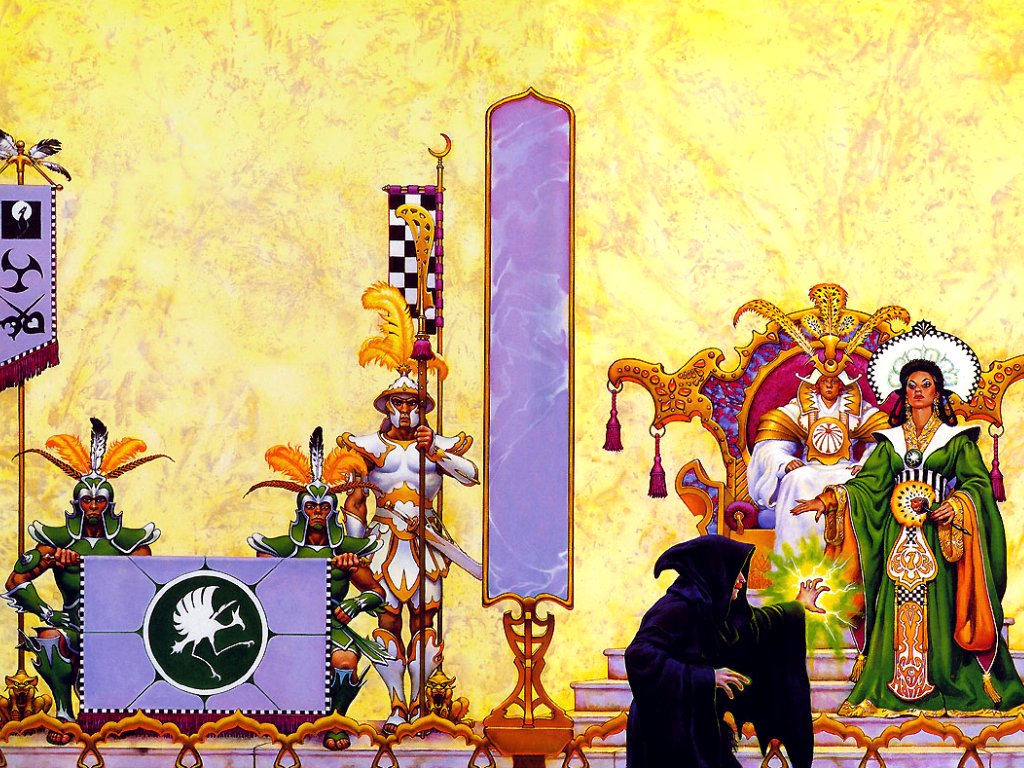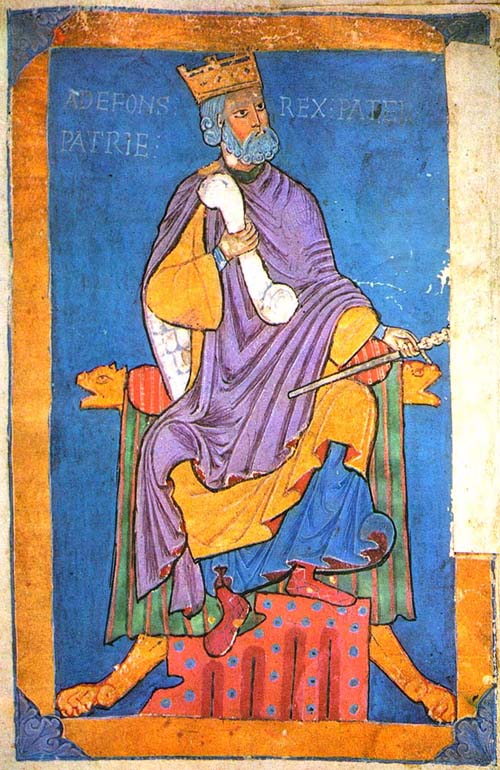Social Class and Rank in Advanced Dungeons & Dragons-
-
Social Class and Rank in Advanced Dungeons & Dragons-
-
| Government Forms | Royal and Noble Titles (Northern European) | Royal and Noble Titles (Asian Forms) | - | - |
| The Campaign | - | AD&&D | - | DMG |
<>
There is no random table
for determination of a character's social status to be found here.
That is because the inclusion
of such a factor will either tell
you little or nothing of
useful nature, or it will abridge your freedom with
respect to development of
your campaign milieu. That is, if such a table
tells you only a little
so as not to force a social structure upon your
campaign, the table can
contain nothing of use. If it states rank, it presupposes
you will, in fact, have
such classes in your campaign when you
might not desire them at
all. There are dozens of possible government
forms, each of which will
have varying social classes, ranks, or castes.
Which sort you choose for
your milieu is strictly your own prerogative.
While this game is loosely
based on Feudal European technology, history
and myth, it also contains
elements from the Ancient Period, parts of more
modern myth, and the mythos
of many authors as well. Within its
boundaries all sorts of
societies and cultures can exist, and there is nothing
to dictate that their needs
be Feudal European.
In THE DRAGON magazine
(#25; Vol. 3, No. 11, May 1979) there appeared an article written by me
which outlines this very
precept and lists a number of government forms
which could be employed
by the DM in his or her milieu.
Actually, some, all, or
none of them could appear in the "world" of any given campaign.
To aid the harassed referee,
I have listed these forms again.
<not all of them ...
anarchism is missing>
Additionally, a list of
nobility (or authorities) in various medieval cultures is given.
I have included the latter
as many DMs prefer to base their campaign upon
a society of this sort,
for they can then draw upon its historical data for
game purposes.
Once a set of social structures
and cultures has been devised for the
campaign, you may or may
not find it useful to assign rank, class, or caste to player characters.
Will your society have hereditary
rank?
Will it go only to males?
females?
both equally?
Will only the first-born
inherit?
Will any inheritance of
property be required to be the entire estate to one individual?
Deciding government form
and culture might well delineate much of the social structure of the nation,
state, or city in question.
<>
Let us assume a social structure
of an aristocracy which is non-hereditary.
Members
of this ruling class are those who have served in the military,
own property
of 100 or more acres extent, and pay an annual tax of not
less
than 10 gold pieces on their income. Land ownership may be waived
in the
case of merchants and tradesmen whose business is such that they
pay not
less than 20 gold pieces in taxes each year. In any event, the
aristocrats
are the only persons eligible for any government office, command
of the
military, and from their number are elected senators who pass laws and
legislate in general.
Former
senators are eligible to election to various tribunals and judgeships.
Former
military officers are appointed by senatorial vote to keep the peace and
police the land.
The majority
of citizens of this state are small land holders, tradesmen, and
various
workers. They provide the food and goods and labor which make
the economy
stable. These people are likewise obligated to serve in the
military,
and if they serve with distinction, they will be awarded land or
stipends
which will elevate them to the aristocracy. Of course, industry,
marriage
or other means can move any of these citizens to a higher status.
Only
a few persons are actually enslaved - criminals and captives of war.
A large
number of the workers are bound to labor for a fixed period, and
some
must likewise serve apprenticeships. These individuals have the
hope
of eventually earning sufficient funds to become landowners or rich
merchants
or tradesmen themselves.
In such
a society, adventurers would come from the younger children of
aristocrats
-- those who will inherit little and wish to remain in the favored
class.
Some would come from the middle group - adventurous persons
who aim
at becoming members of the aristocracy through successes in
such
adventures. Few, if any, would come from the lowest class, i.e. the
bondsmen
and common laborers. Assigning a social class to player
characters
in such a society would not have any particular value unless
you also
devised various rivalries within the classes.
<UA SC tables would fit
or link from here>
With this brief example
in mind, it is easy to see how pointless it is to blindly plug in a set
of "birth tables" based on some form of hereditary,
quasi-European nobility
which may have absolutely no meaning within any of the states of your campaign
milieu.
Furthermore, any use of
such material must be carefully considered even if your campaign does have
such a society and titles of rank,
viz. do you really believe
that one of your PCs should be the first born son of a maior noble or a
ruler?
If so, why is he adventuring?
Where are his guards and
retainers?
Does his father know his
whereabouts?
If so, why is he allowing
the heir to his title and estates to risk his life in such a foolish manner?
Similarly, do such tables
have a logical precedence and order?
Are there offices which
do not logically belong within a feudal society?
Are there classes which
are contradictory, anachronistic, or meaningless?
Unless you specifically
tailor your milieu to fit such tables,
it is likely that there
will be far too many "yes" answers to the above questions.
The intelligent verdict
must be that each DM has to accept the responsibility of deciding for himself
or herself if assigning class distinctions is a vital part of his or her
campaign.
If such is necessary, then
the DM must further accept the work of devising his or her own logical
birth tables, drawn from a society, culture, and government form developed
to fit the overall milieu.
This is unquestionably a
tall order.
Those referees who lack
time will find that it is perhaps better for them to utilize one of the
several campaign scenarios commercially available, adding personal touches,
of course, but basically relying on the cultural and societal developments
of the unit.
Even with such ready-made
campaign settings,
you may or may not wish
to include social classes immediately for player characters.
My own GREYHAWK campaign, for example, assumes all player characters
(unless I personally place one who is otherwise) are freemen or gentlemen,
or at worst they can safely represent themselves to be so.
(Note that the mascuine/human usage is generic; I do not like the terms
freecreatures or gentlebeings!)
Outstanding activity can (and has) brought knighthood or social status
to certain characters. <link:GH>
This was carefully planned as a reward if the characters succeeded, and
it now allows them much latitude of action and assurance of reliable aid
in certain realms --
but it likewise has earned them the enmity of others.
With all of that out of
the way,
consider the list of a few
of the possible governmental forms and then the lists of noble/official
titles.

<
ANARCHY

Note: Anarchy ( ![]() ) is mentioned in the original of this article, in D25.
) is mentioned in the original of this article, in D25.
For some unknown reason,
it was left out of the DMG. A mistake?
>
AUTOCRACY - Government which
rests in self-derived, absolute power,
typified by a hereditary
emperor, for example.

BUREAUCRACY - Government
by department, rule being through the
heads of the various departments
ond conducted by their chief administrators.
CONFEDERACY - Government
by a league of (possibly diverse) social
entities so designed as
to promote the common good of each.
DEMOCRACY - Government by
the people, i.e. the established body of
citizens, whether through
direct role or through elected representatives.
DICTATORSHIP - Government whose final authority rests in the hands of one supreme head.

FEODALITY - Government of
a feudal nature where each successive layer
of authority derives power
and authority from the one above and
pledges fealty likewise.
GERIATOCRACY - Government reserved to the elderly or very old
GYNARCHY - Government reserved to females only.
HIERARCHY - Government which
is typically religious in nature and
generally similar to a feodality.
MAGOCRACY - Government by professional magic-users only.
MATRIARCHY - Government by the eldest females of whatever social units exist.
MILITOCRACY - Government headed by the military leaders and the armed forces in general.
MONARCHY - Government by
a single sovereign, usually hereditary,
whether an absolute ruler
or with power limited in some form (such as
the English monarchs, limited
in rule by the Magna Carta).

OLIGARCHY - Government by a few (usually absolute) rulers who are co-equal.
PEDOCRACY - Government by the learned, savants, and scholars.
PLUTOCRACY - Government by the wealthy.
REPUBLIC - Government by
representatives of an established electorate
who rule in behalf of the
electors.
SYNDICRACY - Government by a body of syndics, each representing some business interest.
THEOCRACY - Government by
god-rule, that is, rule by the direct
representative of the god.
This listing is by no means
exhaustive, and you should feel free to use
other forms, or invent your
own, as the needs of your particular campaign
direct.
<purple for the royals?>
Royal And Noble Titles: (Northern European):


| Emperor/Empress | - | - | - |
| King/Queen | - | - | - |
| - | Archbishop | - | - |
| Duke/Duchess | - | Pfalzgraf | - |
| Prince/Princess | - | Herzog | - |
| Marquis/Marquise | - | Margrave | - |
| Count (Earl)/Countess | - | Graf | - |
| - | Bishop | - | - |
| Viscount/Viscountess | - | Waldgraf | - |
| Baron (Thane)/Baroness | - | - | - |
| - | Abott | - | - |
| Baronet | - | Freiherr | Seigneur |
| Knight | - | Ritter | Chevalier |
| - | Prior | - | - |
Knights are non-hereditary
peers.
Their precedence (or importance)
falls variously depending upon the order of knighthood they hold.
Various officials of the
court will rank amongst the nobility;
an excellent discussion
of this will be found in a good encyclopedia under Precedence, <Order
of Precedence?> <Order
of Succession?>
or in the appropriate section
of TSRs WORLD OF GREYHAWK.
Royal And Noble Titles: (Asian Forms):

| Padishah | Maharaja | Kha-Khan | - | - |
| - | - | - | - | Tarkhan |
| Sultan
|
Shah | Rajah | Ilkhan | - |
| Dey | Caliph | - | - | - |
| Bey | - | - | Orkhon | - |
| Bashaw | - | - | - | - |
| Pasha | - | - | - | - |
| Emir | Amir | - | Khan | - |
| - | Sheikh | Nawab | - | - |
| - | - | Malik | - | - |
<an arabic-style font (etc) would be ok for some of these>
You may find it interesting
to mix titles, invent them,
and place the whole in the
campaign setting you devise accordingly.
Research in various histories
will be helpful, as will be a copy of a good thesaurus. <>
OUT ON A LIMB
More on social class; Gamma World
Dear Editor:
I found TD #25 to be one of the best issues
in a
long time. A few of the articles were really poor, but
this was more than made up for by the cover art
and the group of articles by James Ward.
Let me say from the beginning that I am very,
very tired of Mr. Gygaxís rumbling ramblings on
why AD&D® is the one true RPG.
His point on the
use of social class in FRP was well taken, but the
space he took up was not. I think that there is place
for social class in D&D®,
but to just throw in a chart
with dice roll down the side is foolish unless the DM
(or game designer) does something with it.
In many cases, social standing becomes an excuse
for a lowly, bratty character to take command
of the group. In some cases it is used to great
advantage. Chivalry and Sorcery, for all its faults,
stands almost entirely on class consciousness. And
I love it. But the DM had much more work to do.
Social class in my campaigns is a starting point
for personality. If you are a barbarian, by all means
act like one. If you are a noble, look down your
nose at everyone else. These one line personality
traits do not do justice to class, but the germ is
there.
Another point in relation to social class is the
inclusion of other types of people. Where do Elves
fit in? What about the really weird types, like
Phraints? Obviously, the feudal class structure of
Europe will not work for D&D
the way it is usually
played. First, ruined castles and dungeons would
probably be the property of someone, and adventuring
in them would be akin to poaching in the
kingís forest. In a magic-intensive world, it would
be hard to hide the origins of your wealth.
[...]
Lance Harropís article on orcs
was ridiculous.
His criteria are his only. I like the Archive orcs,
snout and all, since they have a set of Drunken
Orcs. I do agree with the criticism of the pig-orc of
TSR. In the only description of orc features that I
remember from LOTR, they are described as having
broad, flat faces (this was an uruk-hai in Moria).
And what is this: ďTolkienís trolls are D&Dís
ogresĒ?? Says who? What about the trolls
in the
Hobbit? Donít they count as trolls? I am sure that
Tolkien knew ogres from trolls.
<See 3 HEARTS &&& 3 LIONS>
Finieous returns!!! Hooray! Itís great. AD&D
as a
spell book. Potion of malt liquor. Yah!
Who did the excellent cover art? The signature
looks like Pfoglio (?). Who is he? I love it. Itís the
best TD cover ever.
All the articles on Gamma World have aroused
my interest in the game, as I suppose they were
designed to. I especially liked the story. But Allentown
isnít on the map and Reading is. What gives?
Did a city of 100,000+ just disappear by the time of
the holocaust? I notice Lake Geneva made it onto
the map (no doubt the Playboy Club there figured
prominently in such a decision).
I have but one criticism of Gamma World.
Wouldnít all that radiation cause a lot of cancer and
outright death? I think that a one-shot blast with no
side effects would work nicer, as it did in Kamandi.
I would be much happier if you got rid of the
Little Wars articles. The Aztec rules seem nice, but
I
doubt if I will ever play them.
All in all a good ish.
Later,
Marc Jacobs-Allentown, PA
(The Dragon #29)
Iím glad you enjoyed the issue.
THE SORCEROR'S SCROLL is a copyrighted <compile
& link>
column by the publisher/author of AD&D.
D&D
is
the biggest game (involving the most participants)
in the hobby today. While you may not agree with
what a writer says he still has the right to say it
(more on this re Mr. Harrop).
THE DRAGON has tried to establish
itself as a
forum for discussion of games and gaming.
Surely
there have been other articles that you didnít like
besides those you mention. As with any forum, TD
will be (hopefully) used to express many different
ideas and philosophies most of which will be at
odds with one or more of the others.
Basically, you seem to agree with what the
author thought (in the case of SCROLL) but <compile
& link>
thought he took up too much room in which to say
it. While there is no disputing that Gary Gygax has
the reputation for being controversial, so too does
he have a large following of fans and admirers.
Even many of his critics still read whatever he
writes, even if it is merely to see what they donít
believe or agree with this time. The point is that he
is read by many, many people, the majority of
whom are eager for further explanation and expansion
of basic tenets of the game and the gameís
design. Any editor that wouldnít jump at the
chance to print a column by such a figure, regardless
of scopeóbe it a national political writer, a well
known locally writer or a special field writer such as
Mr. Gygaxóisnít much of an editor.
As I have never read Ben Bovaís story, I canít
comment one way or the other, except to say that it
was very similar to a story line that I had been trying
to work on for four or five years myself. I have seen
far too many legitimate cases of parallel development
since I got into this business to cry foul without
documentation. Itís perfectly logical that a writing
gamer could fantasize such a machine seemingly
entirely on his own.<move?>
-- Tim Kask (The Dragon #29)
[...]
